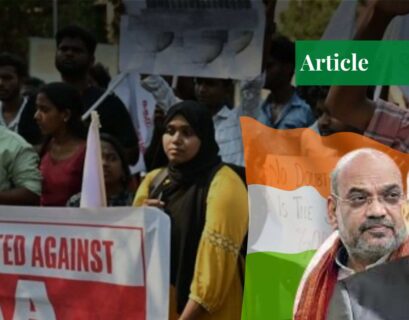Rida Zaman is a law graduate of Bahria University. She is currently practising in Islamabad.
Custodial Torture in Pakistan
Despite pleas and advocacy for the prohibition of torture and degrading treatment in custody, custodial torture and police brutality stand entrenched in the criminal justice system of Pakistan. Wrongful arrest, malicious prosecution, torture inflicted in custody, custodial deaths, sexual harassment, abuse, etcetera are the few corrupt practices of our criminal justice system.
The state where we reside regrettably does not comply with the standards afforded by the Constitution and the international instruments, debilitating the very mandate of the criminal justice system. A common man scuffles to invest his faith in the legal system afforded by the state.
In mid-1989, a delegation of Amnesty International visited Pakistan to observe the state practices in custody. With despair, it was noted by the organization that Pakistan was further away from paradigm standards set by the international laws and the Constitution of Pakistan 1973. Other than torture, extra-judicial killings, police brutality, sexual harassment, and custodial rape were reported by Amnesty International.
In July 1989, an incident at Mandi Bhawadudin Police Station was reported by Amnesty International; two women in custody were brutally beaten up and made to run around the police station. Additionally, they were forced to strip naked in police rooms and on occasion gang raped by the police officials. Although the culprits were charged with multiple offences, no evidence of their conviction was put on record. With minute confidence in the agencies and the legal system of Pakistan, the public hesitates in lodging their due complaints and grievances.
Legislation and Case Laws
The Constitution of the Islamic Republic of Pakistan 1973 is the predominant law for guaranteeing fundamental freedoms. Article 4 of the Constitution of Pakistan endorses the concept of the due process of law; the august court, from time to time too, has stressed the significance of due process of law, afforded by the Constitution of Pakistan itself.
In Federation of Pakistan vs. E-Movers, 2022 SCMR 1021, it was held:
“24. The Constitution of the Islamic Republic of Pakistan (‘Constitution’) is the fountainhead of the rule of law in Pakistan. ‘To enjoy the protection of law and to be treated in accordance with law is the inalienable right of every citizen.’ The rule of law constitutes the bedrock of governance. When the law stipulates that something has to be done in a particular manner that is how it should be done. And any person who exercises authority must do so in accordance with law. The right to be treated in accordance with law was invigorated and bolstered when the Constitution was amended to provide an additional Fundamental Right by adding Article 10A to the Constitution stipulating that, ‘For the determination of his civil rights and obligations or in any criminal charge against him a person shall be entitled to a fair trial and due process.”
To enjoy the protection of the law is undoubtedly an ‘inalienable right of every citizen’; yet the practice is quite contrary to constitutional protection. Torture, degrading treatment by law enforcement agencies, extra-judicial killings, and custodial rapes all attribute to the breach of due process of law and other constitutional protections.
Moreover, Article 9 of the Constitution of Pakistan 1973 guarantees security to every citizen, followed by a right to a fair trial under Article 10A. Yet, the Code of Criminal Procedure (CrPC), 1898, via a plethora of provisions grants wide investigation powers to police officials. Arrest without a warrant, under Section 54 of the CrPC paves the way for arbitrary arrests and detentions.
Section 167 of CrPC permitting police remand opens the door for brutal practices, albeit barred by Article 14 of the Constitution of Pakistan 1973. Inquiry regarding custodial deaths and torture before the Magistrate under Section 176 of the CrPC further suffers from substantive and procedural lacunas. The reports relied upon by the Magistrate, drafted by the officials so involved or connected, deteriorate the purpose of the investigation by the Magistrate.
As depicted in the preceding text, Article 14 prohibits torture for the purpose of extracting evidence. The officials designated with the task of investigation transgress their limits by violating the constitutional mandate for the mere extraction of evidence. The witness statements recorded under Section 161 of the CrPC has no evidentiary value and can be denied before the Magistrate. In 2020 PCr.LJ Note 94, it was held that statements recorded under Section 161 of CrPC are not evidence.
Article 5 of UDHR and Article 10 of ICCPR also condemn and prohibit custodial torture, deaths, and all forms of degrading treatments. Pakistan is also a signatory to UNCAT, which explicitly condones the aforesaid practice and directs the state parties to devise concrete steps for mitigating torture and human degradation in custody under Article 2.
Judiciary has from time to time condemned and prohibited custodial torture in Pakistan. In Benazir Bhutto vs. The President, PLD 1998 SC 388, torture in custody was held as a violation of Article 9, Article 10, Article 14, and Article 25 of the Constitution of Pakistan.
In Benazir Bhutto vs. the President, PLD 1998 SC 388, it was held:
“Extra judicial killings or custodial deaths cannot be justified as valid, legal or proper. Explanation had been given by the Authorities that such persons were hardened criminals and were killed during encounters. Even hardened criminals have a right to be prosecuted and charges to be proved against them according to law.
Such acts by the state machinery violate Fundamental Rights under which a person is entitled to be treated according to law and equally before law. The human dignity is inviolable and that the right to life cannot be taken away except as provided by law. There is no law to justify such an act perpetrated by the state machinery. The object of guaranteeing Fundamental Rights and providing for their enforcement under Article 184(3) is intended to promote social, economic and cultural conditions, which promote life, liberty and dignity. The right to life, therefore, not only guarantees genuine freedom, but freedom from wants, illiteracy, ignorance, poverty and above all freedom from arbitrary restraint from authority.”
In Mst. Rani Bibi vs. S.H.O. and Others, 2010 PCr.LJ, it was held:
“8. The conduct of the respondents smells of wrong doing, violation of the law and rights of citizens guaranteed under the Constitution. If at all Yasin, Musa and Abdul Sattar are involved in criminal activities, they still have a right of due process, to be treated in accordance with law and to a fair trial. I got a distinct impression from the para-wise comments examined by me that a conscious effort was made to short circuit the process of law and punish certain people at the whims of the respondents which cannot be allowed. This sort of behavior would lead to lawlessness and anarchy. This Court cannot step aside, allow State functionaries to take the law in their hands and blatantly violate rights guaranteed to citizens by the Constitution.”
Best Prison Practice: Norway
An unparalleled triumph in Norway’s prison system is patently an outcome of two foremost reforms. In 1998, Norway witnessed its first reform when the Ministry of Justice prioritized rehabilitating prisoners rather than resorting to harsher modes. During the second wave of reforms, the state implemented practices that aided the inmates in finding housing and securing a steady job income prior to their official release.
Norway embraced the concept of ‘restorative justice’, by prioritizing the well-being of inmates. Taking a contrasting sentencing approach, imprisonment is often swapped with a community punishment, which entails 30 to 420 hours of community service, as allocated by the courts.
The Halden Prison in Norway has some unique practices; comfortable living, with many engagements, including vocational programs and arrangements for artistic souls. Inmates are also encouraged to have interpersonal relationships with one another; the practice is quite contrasting in the prisons of the US. However, attaining similar results would mandate time, legislation, and due steps by the organs of the state in Pakistan.
The cost of incarceration per inmate in the Halden Prison is triple the cost for inmates in the United States, thus making it practically impossible for a developing nation like Pakistan to afford such protections, owing to financial constraints and other factors. However, gradually encouraging rehabilitation and improving custodial practices, will aid in reforming the criminal justice of system, which mandates effective legislation and adequate executive steps.
Attempts have been made to criminalize torture, but it remains politically, socially, and morally acceptable as a practice of law-enforcement agencies, being resource-strapped and overburdened. In 2022, a bill prohibiting custodial torture was passed by both houses. The tabled bill was ridiculed and criticized by the advocates of law when the state witnessed the worst forms of torture perpetrated on political officials in 2022.
The Torture and Custodial Death (Prevention and Punishment) Act, 2023
While applauded for finally criminalizing torture, the Act carries ostensible shortcomings. For instance, under Section 11 of the Act, if proven, any complainant filing a mala fide complaint, shall be punished with the same quantum of punishment as prescribed under Section 8 for the perpetrator.
Hence, a complainant is prone to the risk of punishment, if proved against him. This would deter the public from lodging their due complaints, in fear of prosecution. With much autonomy attributed to the investigative agency, transparency of the process is debatable.
Conclusion
The Torture and Custodial Death (Prevention and Punishment) Act, 2023, although needed frantically by the state, is just a step in the process; there also needs to be an efficient implementation mechanism for supplementing the Act. The government continues to explicitly and vividly violate its provisions; In lieu of these apparent breaches and violations, it is fair to label it as a mere ‘dead letter’, devoid of implementation or enforcement.
If you want to submit your articles, research papers, and book reviews, please check the Submissions page.
The views and opinions expressed in this article/paper are the author’s own and do not necessarily reflect the editorial position of Paradigm Shift.



















